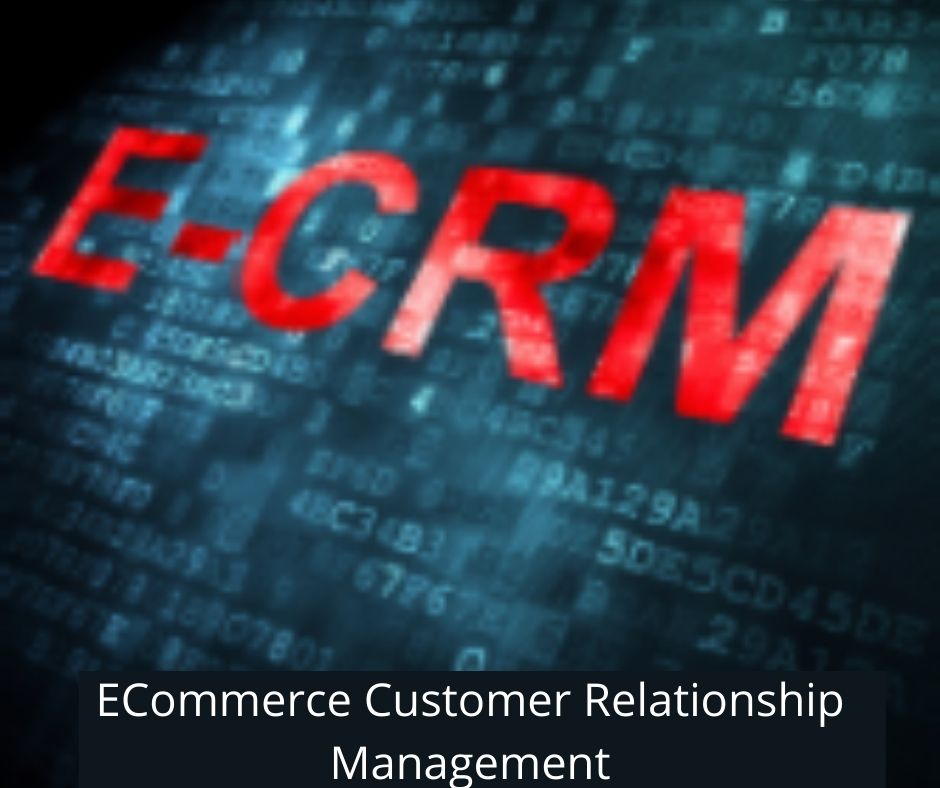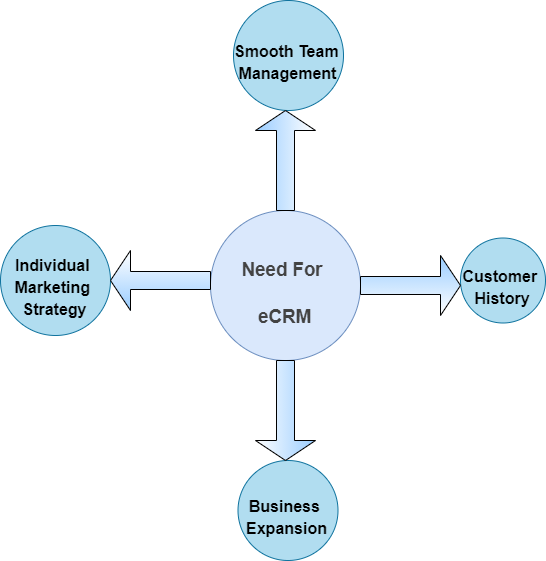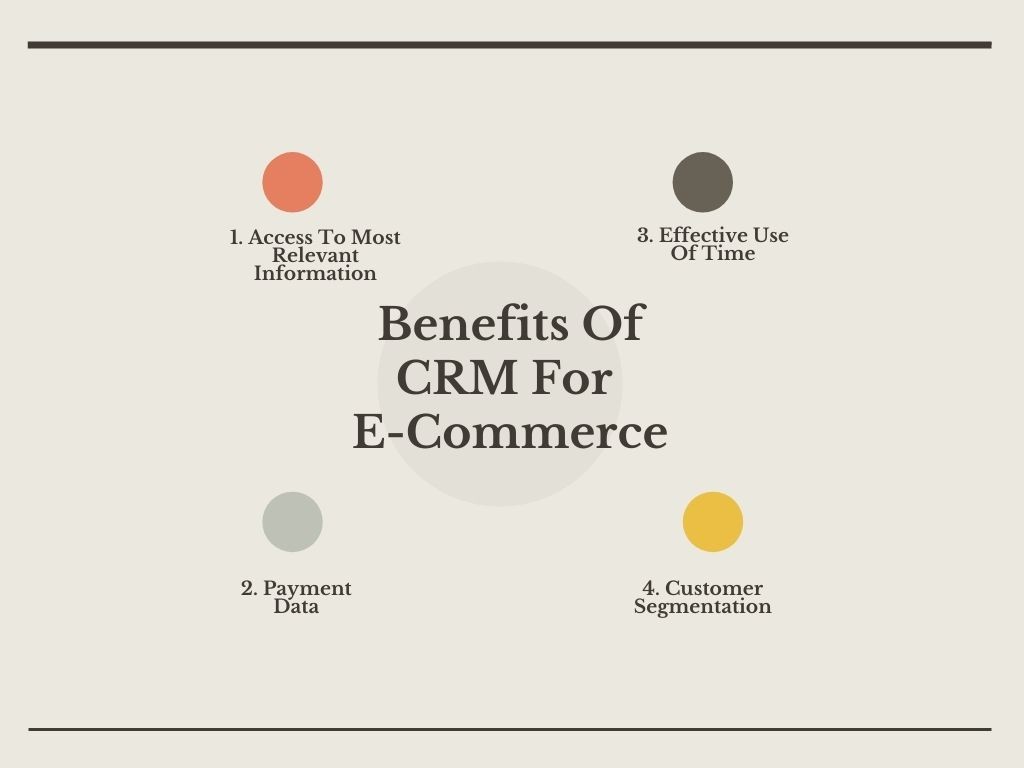Overview
E-commerce customer relationship management is different from the traditional business CRM. As, CRM in any e-commerce business involves the recording, tracking and creating customer email and advertisement campaigns. So, this blog is specially created to explains the meaning structure, how it is different from traditional CRM, benefits, examples where eCommerce customer relationship management and the best software in the world.
CRM Meaning
CRM stands for customer relationship management, which means the management of the interaction and building relations with customers or potential customers to create smooth functioning of the company. These are the different techniques and technology which a company opt to build good relations.

CRM Definition
CRM definition defines the process in which an organization administration analyse the data to understand customer behaviour and to find information to create the procedure and tools for better interaction with customers.
What Is CRM In Marketing
Also, CRM stands for customer relationship marketing, it is very different from customer relationship management. As, customer relationship marketing is the process of building client relationship, customer loyalty and brand value.
Plus it is used to develop long term relations with their established and potential customers with the appropriate strategies and marketing activities. As a result, the organization focuses entirely on corporate performance.
Also, CRM in marketing
- Is used to evaluate customer value.
Like, the organization gives some rewards points after the purchase is made, which can be redeemed later on. Because customer loyalty is an advantage to both organization and customer.
- Provides cross-selling opportunities, where, based on customer approval, a business may pitch proven marketing or brand strategies to more than one client.
What Is CRM In E-Commerce?
Ecommerce customer relationship management is described procedures, techniques to build strong customer relations. Plus, the CRM in e-commerce is necessary to build the database of customer contact information, purchasing behaviour( Part of human resource databases) or any type of data required for analytics.
For example: while making a purchase online a customer has to create an account, give their personal information. As a result, a traditional organization can build and track the purchase and behaviour to provide customize coupons and mails. And that’s how eCommerce customer relationship management starts.
Need For eCommerce Customer Relationship Management
Ecommerce customer relationship management is required the most in e-commerce business to attract the customer and to build brand loyalty. Here are the basic reasons for eCommerce customer relationship management:

Customer History
The very first thing for any eCommerce organization is to know the customer’s history. Because it is important to know about the customer background, it helps the organization to relate the customer’s demographic with their purchase behaviour.
Plus the customer history helps in analysing different categories, performance and helps in taking decisions.
Smooth Team Management
Ecommerce customer relationship management is not only benefits in creating good customer relation but also it is helpful in the smooth functioning of the team. Because the way your customers behaves is directly connected to how you allocate your internal resources. Ecommerce CRM helps you divide your customers into different groups based on certain criteria.
For instance, you can have premium customers who always buy the most expensive products from your website. On the other hand, you can also have a medium category of clients who are loyal to your brand and buy your products regularly.
So, customers with different preferences will have different sales force strategies that will be applied. For this reason, eCommerce CRM is important touse internal recourse efficiently.
Individual Marketing Strategy
Customers having their personalized coupons or offer gives a boost in customer loyalty. Because in the case of eCommerce customer relationship management organization have to appreciate customer brand loyalty very often. Since the customers have too many options and to retain them on your website, it is important to personalize their experience.
Business Expansion
Another important need for eCommerce customer relationship management is to understand the organization’s business growth and its performance. As the customer history purchase behaviour, category growth, product sales help to determine in which sector the organization can expand.
E-commerce CRM vs. Traditional CRM
| Traditional Customer Relationship Management | eCommerce Customer Relationship Management |
| Primary roles of traditional CRM recording storing important customer information. (preferred contact method, account information, and potential customer leads). | E-commerce customer relationship management (e-CRM) primarily focuses on the sales and customer experiences that are conducted online. |
| It helps businesses understand how to adequately interact with their customers and satisfy their needs. | E-CRM analyze the customer information and sales patterns and record and store data. Even, CRM software also analyzes organization site’s metrics, for example:Conversion ratesCustomer click-through rateE-mail subscription opt-insWhich products customers are interested in. |
| The primary goal of traditional CRM is to unite employees and customers by ensuring everyone gets what they need. | E-CRM designed to provide customers with personalized experiences. Creating an environment for customers to customize their experience. And to listen to their needs and making them feel heard are the key areas where E-CRM shines. |
| Finally, traditional CRM provides those in sales with a customer profile detailing information on past purchases and outreach history. | Moreover, E-CRM also helps in targeting and gathering new customers, but also helps in retaining current ones as well. |
Benefits of CRM For E-Commerce
E-commerce based organization have a different approach to CRM. So the benefits and importance to the organization are also different from tradition customer relationship. Here are the different benefits from eCommerce customer relationship management:

Access to Most Relevant Information
A very first benefit for any organization is the access to the information, which is gathered from online actives, customer history, purchase behaviour etc. Because of this information organization can perform analyses for future demand, production, supply chain management, expansion etc.
Payment Data
In case an e-commerce website has multiple platforms for making payment. And to support and secure payments organization have to maintain and requires the data. So that organization will be able to analyse the payments modes that are used most often for which kind of category.
For example, when an organization have the information that consumers prefer to pay from debit/ credit card in case of electronic purchases. So, an organization will give more benefits or coupons to such customers to create strong brand loyalty.
Effective Use of Time
A salesforce in the organization can spend only 11% of their time making sales rest of the time is spent on administration work or some other work. So, eCommerce customer relationship management helps the organization to develop the self-service system, where salesforce only focuses on consulting and giving advice. So, that it can focus their maximum time on improving customer experience.
Customer Segmentation
As one of the basic need of an e-commerce website is to provide customer information, which has proven as one of the most useful tools for eCommerce relationship management. As it helps the organization to understand the links between customer history and its purchase behaviour.
This aspect is important to separate the customers, so that organization can target their different segment of customers differently
Order Management
Order management includes steps from lead generation through to revenue. You can view and act upon order placement, order processing, shipment tracking, delivery and customer feedback against each product. Which not only help in monitoring each product’s growth, it also helps in prompting favourite product as well.
CRM Examples
CRM examples are very much common to see in the world. Here are the examples of big companies that focused on CRM in their organization.
Apple CRM
Ecommerce Customer relationship management plays a pivotal role in Apple’s growth strategy. In case of using any Apple products a customer has to use their Apple ID, This Apple ID is used to access Apple services like the App Store, Apple Music, iCloud, iMessage, FaceTime, and more.
In addition to this, Apple ID is used to synchronize across devices, save music and film preferences, and provide bespoke recommendations based on what you like.
Coca-Cola CRM
Customer relationship management in Coca-Cola has been taking a lot seriously. To ensure this to their customers they have integrated the software to ensure smooth functioning. It uses CRM to promote collaborations and deals with customer issues quickly and efficiently.
By using CRM software, a team member of Coca-Cola identifies the issues, monitor customer behaviour and social media to promote offers and promotions.
Moreover, team members can use mobile apps on the go to access customer history anytime and anywhere, create and update work orders, and send out field technicians in real-time.
Amazon CRM
Amazon is the biggest e-commerce platform and it is only possible because of customer services. Moreover, Amazon has the biggest and complete eCommerce customer relationship management system in the world.
Process in Amazon to buy any product starts from creating an account, giving all the information. As a result, it helps Amazon to track their purchase behaviour, so that they can create personalized e-mail and ad marketing strategies.
Moreover, you can configure your account to set up purchases in one-click. This is one of Amazon’s most popular feature and customers appreciate it as it dramatically speeds up the checkout process when making a purchase.
CRM Tools
ECommerce customer relationship management is widely managed by the CRM tools which designed to help the organization manage the activities and to track the statics and the performance of the organization. Plus these tools are designed to give the appropriate suggestions to create a uniform performance. Here are the different software used by small, eCommerce customer relationship management:
CRM, Salesforce
CRM – salesforce is one of the world’s leading cloud-based CRM tool/software which provides creative CRM solutions that can be effectively used for all the business requirement companies from high scale enterprises to small start-ups.
Salesforce CRM helps to understand customer requirements, it indicates new ways to help, solves issues faster and provides a quick and clean deployment. With just a single view, we can do the selling, serving and marketing like anything.
HubSpot CRM
In today’s competitive market, HubSpot is one of the famous and most commonly used CRM tools. As it has created a great impact on its Clients with its powerful mechanism and capabilities. Because of it is free to a huge extent and this attracts most of the Clients.
HubSpot’s simple platform allows Clients to start quickly without even changing much. It is simple and fast and has most of the features that the other CRM’s possess. HubSpot is no doubt provides the best integration CRM environment which the other CRM tools do not provide for free. It is flexible and powerful software.
SAP CRM
SAP CRM is one of the famous Customer Relation platforms that is developed to support improved working capabilities and also provides you with a very good customer interaction experience for better business growth.
CRM in SAP allows deploying the application either in the cloud or on-premise depending on the customer requirement. And it plays a vital role in boosting customer engagement, sales, and marketing. It automates and integrates all the customer-facing activities.